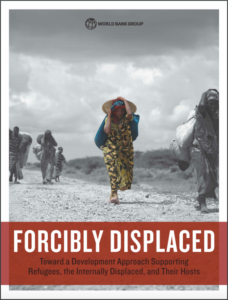 JIPS welcomes the World Bank’s new report, launched in September 2016, as a major step towards making the humanitarian-development nexus more concrete when addressing crises of forced displacement. The report identifies five focus points in which development actors can engage to resolve the challenges of forced displacement.
JIPS welcomes the World Bank’s new report, launched in September 2016, as a major step towards making the humanitarian-development nexus more concrete when addressing crises of forced displacement. The report identifies five focus points in which development actors can engage to resolve the challenges of forced displacement.
In Forcibly Displaced – Toward a development approach supporting refugees, the internally displaced, and their hosts the World Bank identifies the medium-term and socio-economic dimensions of displacement as the focus for potential development interventions. It also highlights the necessity for development and humanitarian actors to cooperate in finding sustainable solutions.
The global displacement crisis is centred in developing countries, says the report. Displaced people are faced with specific and extreme vulnerabilities and often impact the socio-economic context of their host communities. Because such vulnerabilities differentiate displaced people from other poor people in communities, broad-based interventions may not be enough; instead they need to be complemented by displacement specific programs. As the report highlights, there is a need for development actors to revise their design and implementation of poverty reduction programs in displacement situations in order to effectively address this phenomenon.
The five focus points that development actors can engage in are:
JIPS looks forward to lending its expertise in collaborative data collection and analysis in protracted displacement settings as the World Bank and other actors join the humanitarian sector in addressing displacement. In particular, JIPS hopes to contribute through the durable solutions project that aims to help governments, humanitarian and development actors to identify displacement-specific vulnerabilities and thereby fill a key gap identified by the World Bank.